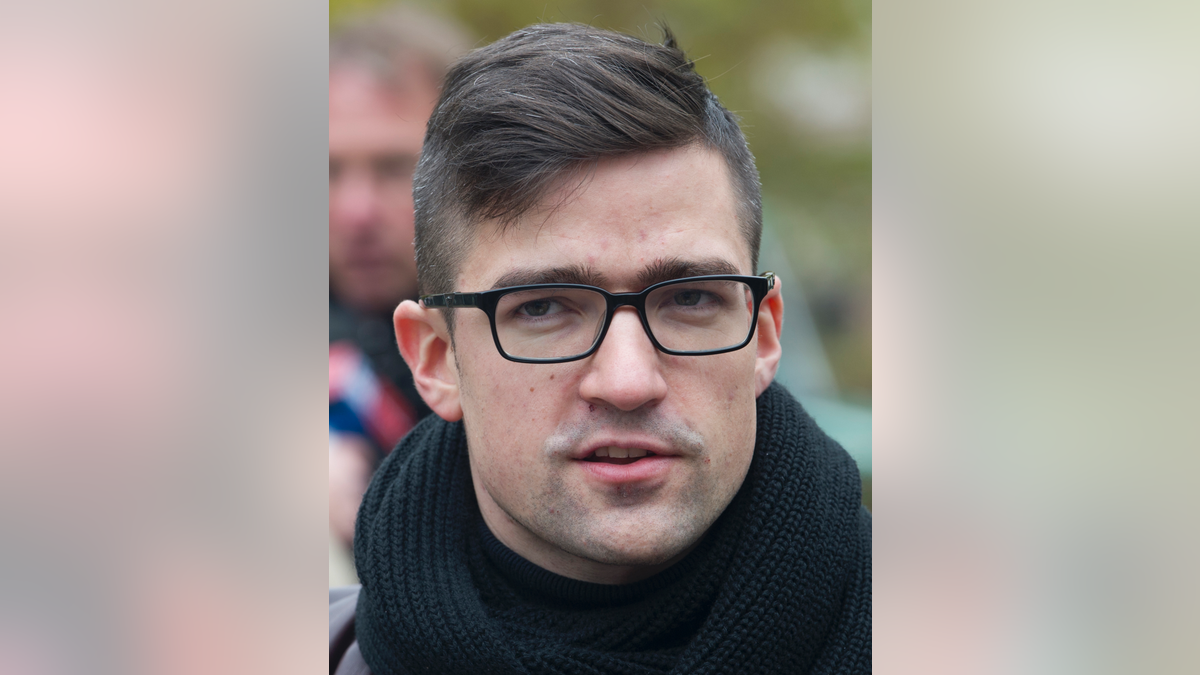
File--- In this picture taken Nov.5, 2016 Martin Sellner, leader of the right-wing populist Identitarian movement of Austria is seen giving an interview in Berlin, Germany. (Paul Zinken/dpa via AP)
BERLIN – A prominent Austrian far-right activist who is under investigation for ties to the suspected New Zealand mosque gunman said Thursday that U.S. authorities have canceled his permit to travel to the United States without a visa.
Austrian authorities on Monday searched the home of Martin Sellner, a leading member of the Identitarian Movement of Austria, and seized electronic devices belonging to him and his American fiancee Brittany Pettibone. The raid followed the discovery of a 1,500 euro (almost $1,700) donation sent to Sellner by the alleged Christchurch attacker last year.
In a statement on social media, Sellner said he learned Thursday that U.S. authorities have revoked his ESTA permit. The visa waiver program allows citizens of some countries to enter the U.S. for under three months without needing a visa.
"We had actually planned to get married in the U.S. this summer and I've always been able to get in (to the United States) without problems," Sellner said on his YouTube channel, noting that American authorities hadn't denied him entry over his political activities in the past.
The U.S. Embassy in Vienna declined to comment on the case and the Department for Homeland Security didn't immediately respond to an email seeking comment. It was unclear whether Sellner could still apply for a regular visa to travel to the United States.
Last year, Sellner and Pettibone were denied entry to Britain after officials deemed their presence to be "not conducive to the public good."
The Identitarian Movement has become the focus of an investigation by Austrian authorities following the discovery of the donation from the suspected New Zealand gunman Brenton Tarrant.
Austria's conservative Chancellor Sebastian Kurz told reporters Wednesday that his government planned to act against extremism "whether it's radical Islamism or far-right fanatics."
"Furthermore (we will) examine whether the Identitarians can be dissolved," he said.
Austrian Interior Minister Herbert Kickl told lawmakers Thursday that authorities haven't found any evidence that Tarrant had "personal contacts to extremist persons or organizations" when he visited Austria from Nov. 27 to Dec. 4., 2018. Tarrant, an Australian citizen, had earlier spent time in Hungary, Romania and Bulgaria, and later flew to Estonia, he said.
Tarrant has been charged with murder over the March 15 massacre of 50 people in the southern New Zealand city.
Sellner told The Associated Press that he had exchanged emails with Tarrant after the donation and pointed him to his English-language YouTube channel, but denied having any involvement in the attack or inspiring Tarrant with his anti-Islam ideology.
"Of course I was shocked when I got the final proof that it was indeed Tarrant," Sellner said in an email, but added: "I can only regret what's my fault. I don't see any possibility for me to have spotted anything terrorist in this donation or the emails at the time."
Sellner said his group encourages people to campaign publicly and peacefully against mass immigration and the perceived growing influence of Islam, while opposing "extreme-right terrorism and the polarization of society."







































